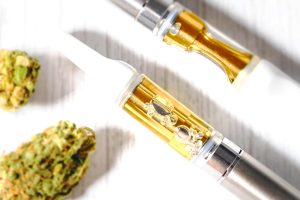DEA Declares Delta-8-THC-O & Delta-9-THC-O Illegal, Not Hemp
 Despite being widely labeled as hemp-derived novel cannabinoids, Delta-8 THC-O and Delta-9-THC-O have been declared illegal by the U.S. Drug Enforcement Administration. In a letter to a law firm dated Feb. 13, 2023, the agency stated in no uncertain terms that these popular products – referred to collectively under the title THCO – are legally considered “controlled substances.” This directly contradicts with previous federal court rulings that determined delta-8 products could be considered “hemp” and thus lawful under the 2018 Farm Bill.
Despite being widely labeled as hemp-derived novel cannabinoids, Delta-8 THC-O and Delta-9-THC-O have been declared illegal by the U.S. Drug Enforcement Administration. In a letter to a law firm dated Feb. 13, 2023, the agency stated in no uncertain terms that these popular products – referred to collectively under the title THCO – are legally considered “controlled substances.” This directly contradicts with previous federal court rulings that determined delta-8 products could be considered “hemp” and thus lawful under the 2018 Farm Bill.
Note: Delta-8-THC-O and Delta-9-THC-O are different than delta-8-THC and delta-9-THC. While the latter both exist naturally in the hemp plant, THC acetate (better known as THC-O) doesn’t. That’s the underlying basis for the DEA’s position.
THC acetate is most typically a component of products like edibles and vapor cartridges. As Los Angeles cannabis business lawyers, we want to ensure any companies that currently produce, transport, stock, and sell these products take immediate note. It’s not immediately clear how this will impact the market, so it’s a smart idea to immediately consult with a cannabis lawyer on how best to proceed and ensure you’re on the right side of the law.
How the Farm Bill Factors
The 2018 Farm Bill opened the door to a number of cannabinoid products that are known to also have intoxicating properties. This has drawn the attention and ire of some politicians and interest groups. The additional scrutiny has led to legal challenges that have wound up in court.
Last year, the U.S. Court of Appeals for the Ninth Circuit involved a copyright/trademark/patent protection case. The defendant didn’t even contest that it was selling counterfeit versions of the plaintiff’s delta-8 THC products. The appellate court affirmed the lower court’s grant of a preliminary injunction’s on the defendant’s sales, and held that the plaintiff was likely to prevail on their claims. What the defendant argued was that plaintiff couldn’t own a valid trademark for its products because of the illegality doctrine (which has been cited in other cannabis trademark infringement and patent infringement cases). Basically, products that are illegal under federal law aren’t entitled to federal protections – such as those for trademarks. Plaintiffs argued that delta-8 THC was legalized under the 2018 Farm Bill as a hemp-derived product. Defendants argued that was not the intention of the legislature to approve legalization of psychoactive substances – which delta-8 THC is. The appellate court sided with plaintiffs, finding the 2018 Farm Bill language was unambiguous, and the delta-8 products in question fit the requirement of containing less than 0.3 percent of THC.
But Delta-8-THC-O and Delta-9-THC-O are not the same thing.
DEA’s Novel Cannabinoid Stance
Essentially what the DEA’s Drug & Chemical Evaluation Section has concluded is that if a certain cannabinoid or compound is produced naturally by the hemp plant – then it’s legal (as long as it doesn’t have more than 0.3 percent THC). It’s not a controlled substance, no matter how it’s processed or manufactured into the final product. That’s important to note because delta-8 actually is synthetically-manufactured from CBD (which is hemp-derived). However, trace amounts of it also occur naturally in the plant.
While the Delta THCO products do contain THC that has a similar structure chemically and similar pharmacological outcomes compared to hemp plants, they aren’t the same – and they don’t naturally occur in the plant. They can only be produced through processes that are synthetic.
The DEA’s statement doesn’t clarify the rules for all novel cannabinoid derived from hemp, but it’s a start.
If you have questions about how to ensure your Southern California cannabis business is adhering to current laws and regulations, our marijuana business lawyers help.
The Los Angeles CANNABIS LAW Group represents growers, dispensaries, ancillary companies, patients, doctors and those facing marijuana charges. Call us at 714-937-2050.
 Cannabis Law Group's Medical Marijuana Legal Blog
Cannabis Law Group's Medical Marijuana Legal Blog




